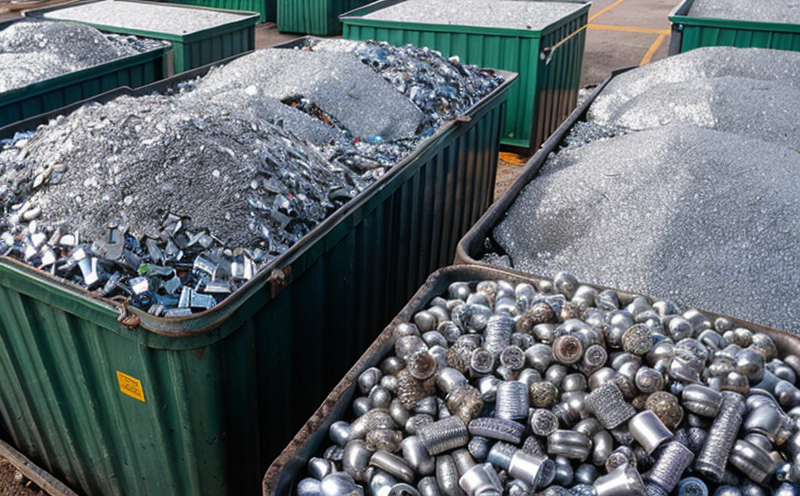EN 17413 Alloy Composition Verification for Recycling
The European standard EN 17413:2018, titled “Alloys – Determination of chemical composition in recycled materials,” provides a robust framework for the verification of alloy compositions within recycled materials. This service is essential for ensuring that metals and alloys used in recycling processes meet stringent quality standards, thereby enhancing product integrity and environmental sustainability.
The primary goal of this service is to ensure accurate and reliable determination of metallic elements present in scrap metal or alloyed waste streams destined for recycling. By adhering strictly to EN 17413, we guarantee that our clients receive precise results aligned with international best practices. This process involves meticulous sample preparation followed by advanced analytical techniques such as Inductively Coupled Plasma Optical Emission Spectroscopy (ICP-OES) and Energy Dispersive X-ray Spectrometry (EDX).
Accurate alloy composition verification is critical for industries reliant on recycled materials, including automotive, aerospace, electronics manufacturing, and construction sectors. Ensuring compliance with EN 17413 helps manufacturers avoid costly penalties associated with non-compliance while also fostering trust among stakeholders.
The standard specifies detailed procedures for sampling scrap metal or alloyed waste streams, preparation of test specimens, and interpretation of analytical results. It emphasizes the importance of traceability from raw materials through to final products, ensuring that all parties involved understand the provenance and quality attributes of recycled components.
Our team employs state-of-the-art laboratory facilities equipped with cutting-edge instrumentation capable of detecting even minute concentrations of various metals. Using these tools allows us to deliver highly accurate results quickly and reliably, enabling clients to make informed decisions regarding their supply chains.
In addition to providing test data, our service offers comprehensive reports outlining the full range of elements detected in each sample along with detailed comparisons against specified limits set forth by EN 17413. These insights enable companies to optimize their recycling processes and ensure consistent product quality across batches.
Quality and Reliability Assurance
We maintain strict adherence to ISO/IEC 17025 accreditation standards, which ensures that our laboratory practices meet internationally recognized criteria for competence and impartiality. Our experienced technical staff includes certified analysts who possess extensive knowledge of both the theoretical underpinnings and practical applications of EN 17413 compliance.
The quality management system (QMS) we have implemented encompasses rigorous internal audits, continuous improvement initiatives, and stringent controls over all aspects of our operations. From sample receipt to final report generation, every step is meticulously documented and reviewed by qualified personnel.
Our commitment to excellence extends beyond mere compliance with industry standards; it also entails proactive efforts aimed at preventing errors or inconsistencies from occurring in the first place. This approach includes regular calibration of equipment, participation in proficiency testing programs recognized globally, and ongoing training for our staff members.
International Acceptance and Recognition
Compliance with EN 17413 is widely accepted not only within Europe but also internationally. Many countries recognize this standard as a benchmark against which other methods can be compared or even adopted locally. This global recognition enhances the value proposition of our services since it allows clients to easily integrate these results into their existing supply chain management systems without requiring additional validation steps.
Furthermore, adherence to such standards fosters greater transparency and trust among all parties involved in transactions related to recycled materials. It provides assurance that the products being traded are genuinely what they claim to be, thus promoting fair trade practices and reducing instances of fraud or misrepresentation.
Use Cases and Application Examples
| Use Case/Application Example | Description |
|---|---|
| Automotive Recycling | In the automotive industry, accurate alloy composition verification is crucial for ensuring that recycled components meet stringent quality requirements. For instance, scrap from end-of-life vehicles (ELVs) must be analyzed to determine whether it contains valuable metals like copper, aluminum, or steel. Proper identification of these elements allows manufacturers to recycle them efficiently and reuse them in new vehicle parts. |
| Electronics Manufacturing | The electronics sector relies heavily on recycled materials due to the increasing demand for sustainable practices. By verifying the composition of scrap metals from discarded electronic devices, companies can recover precious metals such as gold, silver, platinum, and palladium efficiently. This process not only reduces waste but also ensures that recovered materials are suitable for high-quality applications. |
| Construction Industry | In construction projects where new steel structures are being erected using recycled steel beams and columns, accurate verification of alloy composition is vital to ensure structural integrity. Ensuring that the recycled steel meets specified strength requirements helps prevent potential failures in critical load-bearing elements like girders or trusses. |
| Aerospace Manufacturing | The aerospace industry demands exceptional quality from all materials used, including those derived from recycling programs. By rigorously verifying the composition of aluminum alloys and other metals obtained through scrap collection initiatives, manufacturers can guarantee that parts meet stringent tolerances necessary for safe operation in aircraft structures. |
| Renewable Energy Projects | Rapid growth in renewable energy sectors has increased interest in recycling photovoltaic panels and wind turbine blades. Accurate composition verification ensures that recovered materials are fit-for-purpose, whether reused directly or processed further into new products like roofing sheets or fencing materials. |
| Plastic-to-Fuel Conversion | With increasing pressure to reduce plastic waste, some facilities are exploring methods of converting plastic waste into fuel. However, the presence of trace metals in this type of feedstock can impact the efficiency and quality of the resulting fuels. Proper alloy composition analysis helps optimize these processes by identifying suitable blends that yield optimal performance. |
| Industrial Waste Management | In industrial settings, proper handling of waste streams involves careful sorting and segregation based on material type. Accurate verification ensures that only appropriate materials are recycled according to their designated categories, minimizing contamination risks and maximizing resource recovery rates. |





